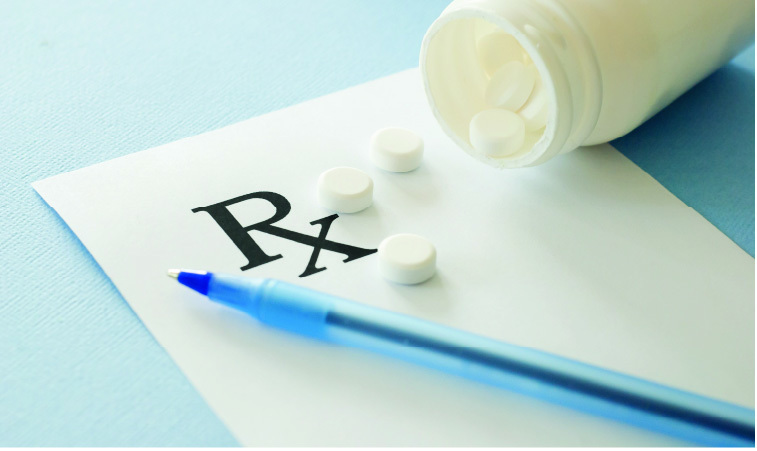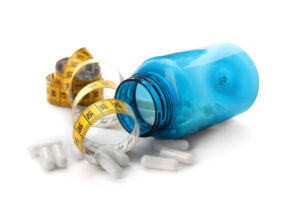Dexedrine and Adderall are two of the most commonly prescribed medications used to treat attention deficit hyperactivity disorder (ADHD). Because they both contain forms of amphetamine, there are many similarities between the two medications.
While Adderall is the most common ADHD medication and is often the first-choice treatment for the disorder, there are a few benefits to Dexedrine that might make it more suitable for certain patients. In this article, we will discuss the similarities and differences between these two stimulants to help you decide which medication is right for you. If ADHD is affecting your daily life, medications like Adderall or Dexedrine could help you improve your focus, attention span, time management skills, and more. Find a provider today to receive a comprehensive and affordable online ADHD diagnosis and treatment plan, which can include prescription medication, in as little as 48 hours.
| Dexedrine | Adderall | |
|---|---|---|
| Drug Class | Schedule II stimulant | Schedule II stimulant |
| Brand / Generic Status | Brand name for dextroamphetamine | Brand name for amphetamine salts |
| Form(s) of the Drug | • Extended-release capsules • Immediate-release tablets • Clear, bubblegum-flavored liquid suspension |
Immediate release tablets, Extended-release capsules |
| Standard Dosage | Liquid suspension: • 5mg per teaspoon Tablets: • 2.5mg to 30mg Capsules: • 5mg • 10mg • 15mg |
5mg to 30mg tablets |
| Typical Treatment Length | Short-term use only | Long-term use |
| Conditions Treated | FDA-approved uses: • ADHD • Narcolepsy Off-label uses: • Obesity • Depression |
FDA-approved uses: • ADHD • Narcolepsy (sleep disorder) Off-label uses: • Depression • Anxiety • Bipolar disorder |
| Cost | Brand-name Dexedrine: • $743 for a 30-day supply Generic form (dextroamphetamine): • $17 for 30 days of 5mg capsules • $115 for 30 days of high-dose, extended release capsules |
Brand-name Adderall: • $8 per 5mg tablet • $237 for a 30-day supply Generic form (amphetamine salts): • $13 for 30 days of 5mg tablets • $85 for 30 extended-release pills |
| Side-Effects | Common side effects: • Dry mouth • Weight loss • Loss of appetite • Nausea • Diarrhea • Headache • Insomnia • Restlessness Serious side-effects: • Heart or circulation problems • Changes in behavior • Seizures • Muscle twitches • Changes in vision |
Common side-effects: • Decreased appetite • Weight loss • Dry mouth • Nausea • Headache • Fever • Trouble sleeping Serious side-effects: • Signs of blood flow problems • Behavior changes • Uncontrolled movements • Shortness of breath • Irregular heartbeat • Seizures • Trouble speaking |
| Warnings For Use | Contraindicated conditions: • Heart problems • High blood pressure • Mental illness • Circulation problems Drug/food interactions: • Acidic foods (fruits, juices) • Vitamin C supplements • Antacids • Antidepressants • Blood pressure medication • Seizure medicine |
Drug interactions: • SSRIs and SNRIs • Blood pressure medication • Acid reflux medication • Blood thinners • Cold or allergy medication • Opioid-based medications • Seizure medication |
Dexedrine vs. Adderall
Both Adderall and Dexedrine are central nervous system stimulant medications that affect neurotransmitters in the brain. This increase or improvement of effectiveness in norepinephrine and serotonin can lead to increased focus and overall alertness as well as a feeling of general well-being. Because ADHD, among many other symptoms, is typified by a lack of being able to focus, these medications can have a profound effect on those with the disorder.
While Dexedrine and Adderall are both used to treat ADHD, their chemical compounds are different. Dexedrine contains only dextroamphetamine sulfate, while Adderall contains a 3:1 mixture of dextroamphetamine and l-amphetamine salts.
Because of this difference, Dexedrine only affects the central nervous system, while Adderall targets both the CNS and peripheral nervous system. Adderall only focuses on dopamine reuptake, while Dexedrine can help increase the production of both dopamine and norepinephrine.
Dexedrine is typically considered to be the stronger medication of the two, but the compounds in Adderall often make it more effective at targeting ADHD symptoms. However, those who are resistant to Adderall may benefit from Dexedrine, and vice versa.
Dexedrine and Adderall come in similar dosages and both are available in extended-release formulas that allow for the release of amphetamine over time and as such don’t have to be taken as often. Dexedrine is a bit less expensive than Adderall. Both drugs can have serious interactions with other medications and should be taken only under the supervision of a licensed clinician.
According to the Drug Enforcement Agency (DEA), both Dexedrine and Adderall are Schedule II narcotic drugs, which indicates an increased risk of addiction and substance abuse. You should avoid both medications if you have a history of substance abuse. These ADHD medications are restricted on a varying basis state by state.
People with high blood pressure need to be especially careful with any sort of stimulant medication, including Dexedrine and Adderall, as they can raise blood pressure. If you experience a severe headache, anxiety, chest pain, uneven heartbeat, or shortness of breath after taking these drugs, stop taking them and contact your doctor immediately.
Dexedrine
Forms & Dosages
Dexedrine comes as capsules in dosages of 5 mg, 10 mg, and 15 mg, tablets with 7 different dosages from 2.5 mg to 30 mg, and as a liquid available as 5 mg/teaspoon. Both extended release and immediate forms of Dexedrine are available.
Indications & Conditions Treated
Dexedrine is primarily used to treat ADHD, although it can also be used for narcolepsy (falling asleep during the day) and obesity. For obesity, the benefits of Dexedrine appear to be short-term.
Cost
The cost of generic Dexedrine (dextroamphetamine) ranges from as low as $17 for 30 days of 5 mg pills to as much as $115 for 30 days of the highest dose extended-release capsules. Most insurances cover generic Dexedrine.
Side Effects
Some of the most significant and common side effects of Dexedrine include a loss of appetite/weight loss, nausea, diarrhea, and headache. Dry mouth, insomnia, and restlessness can also occur.
Warnings for Use
Medication misuse warning: Dexedrine is considered a federally regulated controlled substance, which means you’re at risk of forming a harmful dependency if you take it incorrectly.
When taken in higher than prescribed doses, or in a manner not directed by a healthcare provider, Dexedrine can produce feelings of euphoria, increased energy, and focus. These feelings can lead some individuals to misuse the drug, which can, in turn, pave the way for addiction.
Discontinuing the medication abruptly can cause withdrawal symptoms, including fatigue, depression, and sleep problems, which can be quite severe.
There’s also a psychological component to dependency. Some individuals may begin to rely on Dexedrine to manage daily tasks or to simply feel ‘normal.’ Over time, this can lead to a cycle where the person feels they cannot function without the medication, perpetuating its use and potentially escalating doses beyond what is medically recommended.
Adderall
Adderall is also used primarily to treat ADHD. It is a combination of dextroamphetamine (Dexedrine) and l-amphetamine salts. It treats ADHD by stimulating the central nervous system, increasing the availability of neurotransmitters, and speeding up brain activity.
Forms & Dosages
Dosages of Adderall range from 5 mg to 30 mg tablets and are taken two to three times per day. Adderall XR, which is the extended-release version, is a capsule that also ranges from 5 to 30 mg. Because it is an extended release, however, it is only taken once a day.
Indications & Conditions Treated
Adderall is FDA-approved to treat ADHD and narcolepsy. It has several off-label uses, however, and has been used to treat disorders including depression, anxiety, and bipolar disorder.
Cost
Without insurance, brand-name Adderall can cost nearly $8 per 5 mg tablet, with a 30-day supply costing as much as $237.
However, Adderall comes in a generic form as well, which can cost far less. The cost of generic Adderall ranges from $13 for 30 days of 5 mg pills up to $85 for 30 days of a maximum dose of Adderall XR extended-release capsules. (Extended-release ADHD medications tend to cost more than immediate-release medications.)
Side Effects
The side effects of Adderall are similar to those of Dexedrine with loss of appetite/weight loss, insomnia, nausea, dry mouth, dizziness, and restlessness being the most common. Some less common side effects include chronic muscle twitches, constipation, drowsiness, heart pounding, diarrhea, excessive sweating, and taste impairment.
Warnings for Use
Medication misuse warning: Adderall is also a federally regulated controlled substance and carries a high risk of dependency and abuse. It should only be used as prescribed by a healthcare professional. When taken in higher doses or in ways not directed by your provider, Adderall can lead to addiction.
Abruptly stopping Adderall can result in withdrawal symptoms, including extreme fatigue, persistent depression, and disturbances in sleep patterns that can significantly impact daily life. Discuss any plans to discontinue Adderall use with your healthcare provider, as they can provide guidance on tapering off the medication to minimize withdrawal effects.
Licensed providers on Klarity provide personalized treatment. Find a provider that matches your needs and preferences.
Dexedrine vs. Adderall: Which ADHD Medication is Right for You?
The chemical compounds found in Adderall cause a slightly different reaction in the brain and body when compared to Dexedrine. Dexedrine is a stronger form of dextroamphetamine, making it more effective for some people. However, others may benefit from the combination of chemicals found in Adderall.
These subtle differences between the two prescription medications make it critical that you don’t try to self diagnose on the internet and instead work with an experienced healthcare provider who can find the medication that’s right for you.
Find the Right Medication For You With Help From Klarity
If you need a prescription for an ADHD medication like Dexedrine or Adderall, a provider on Klarity can help you decide which, if any, is right for you.
With Klarity, you can get connected with a licensed and board-certified ADHD specialist in your state to diagnose your symptoms and begin personalized treatment in just 48 hours. Schedule an appointment on Klarity today.







